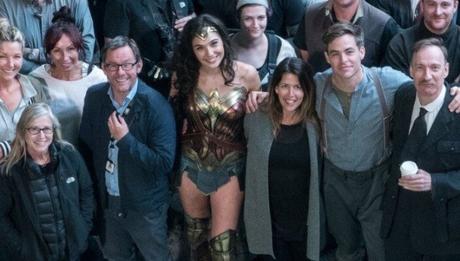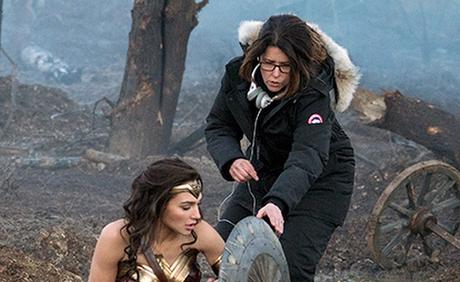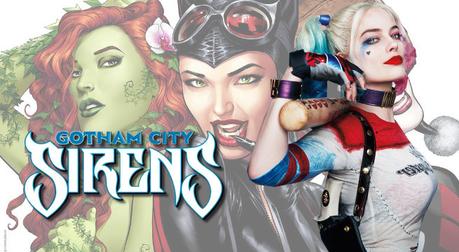
Before I start into my whole spiel about how this could all go horribly wrong, let's just stop to scoreboard watch and celebrate:
They did it. They actually did it. Patty Jenkins just broke through the glass ceiling for female directors everywhere, easily setting the record for largest opening weekend for a film directed by a woman, beating the $85m posted by Sam Taylor-Johnson's Fifty Shades of Grey. Gal Gadot just made Brie "Captain Marvel" Larson's life easier and gave hope to any other actresses hoping to someday star in their own female-led superhero movie. WB finally has a financial AND critical hit from its much beleaguered DC Extended Universe, which suddenly has positive buzz and momentum, two things it's never really had before. And women finally have a superhero movie of their own to support, turning out in unprecedented numbers in making up 52% of Wonder Woman' s domestic audience, an unheard of total for a superho movies since they typically skew 60% male.
In short, Wonder Woman is a giant hit. It's a hit here, with a stellar RottenTomatoes score, "A" on CinemaScore, premature Oscar talk and a $100m opening, the sixth biggest of all time for any non-sequel comic book movie. It's a hit everywhere else, with Warners claiming it came in ahead of Man of Steel in most markets (particulalry China, where it made $38m) and is currently pacing ahead of the first two entries in each of the following franchises: Guardians of the Galaxy, Iron Man, Captain America, Thor. Sure, Man of Steel, Batman v Superman and Suicide Squad all had superior domestic openings, but they also all cost considerably more to make (in BvS's cases, twice as much) and engendered little good will with audiences. Besides, Wonder Woman is arguably more comparable to one of Marvel's sub-franchise (i.e., solo) films, and it's already beating the crap out of every Thor and Captain America film other than Civil War.
As Lexi Alexander, the last woman director to go through the studio system and make a superhero movie ( Punisher: War Zone), once explained this could have all gone south fast: "How many male superhero movies fail? So now, we finally get Wonder Woman with a female director; imagine if it fails. And you have no control over marketing, over budget. So without any control, you carry the f-ing weight of gender equality for both characters and women directors. No way."

Recent years have brought increased interest in improving diversity in front and behind the screen, but the pace of change has been so glacial that it actually triggered a federal probe into discriminatory hiring practices in the industry. There have been gains in TV and documentaries, but in the feature film world the problem keeps getting worse. According to Stacy Smith of the University of Southern California, "Just 4% of all directors across 1,000 top movies from 2007 to 2016 were female, and of those only three were black women."
As such, Jenkins' career path is not unique - she made one Oscar-winning indie ( Monster) and then a lot of TV despite brief flirtations with various feature film projects which didn't pan out (most notably Thor 2). Her success with Wonder Woman now gives hope to any number of other woman directors whose body of work in extreme indie film and/or TV suggests an ability to do much more and succeed if simply given the chance to make a blockbuster film.
There are already signs of progress. Captain Marvel, due in 2019, will be co-directed by Anna Boden, working with her longtime collabroator Ryan Fleck ( Mississippi Grind). Silver & Black, Sony's Silver Sable and Black Cat team-up, recently hired director Gina Prince-Bythewood ( Love & Basketball), setting her up to become the first black woman to direct a superhero movie (assuming Silver & Black gets made, which is not a given, not with Sony's track record). Plus, outside of the superhero genre Niki Caro (Zookeeper's Wife) and Ava DuVernay (Selma) have been entrusted with blockbuster budgets to respectively bring Mulan and Wrinkle in Time to life.
Prince-Bythewood and DuVernay pledged their support for Wonder Woman over the weekend:
But Hollywood is still an industry overwhelmingly run by men. You would think that Wonder Woman disproves all the old excuses, that Jenkins and company have shown a woman with little feature-film expereince can indeed command a sizable budget and (mostly male) crew and translate it into positive results and that the failures of Catwoman and Elektra are no longer acceptable excuses for not making female-led superhero movies. However, it's not hard to imagine some studio suit writing all of this off as simply the inevitable result of being the first - the first female-led superhero film of the current era, the first Wonder Woman movie ever. It didn't matter who directed this because Wonder Woman is the most popular and long-lasting female superhero in all of comics. It was going to be a hit no matter what. Let's see how one of these movies focused on a lesser known female superhero plays, or so one line of thought might go.
That view might be in the minority. In fact, I'd be shocked if by the end of Wonder Woman's monumental Friday someone at WB hadn't already called Margot Robbie and David Ayer to see if they can possibly get moving on Gotham City Sirens any quicker:

Here in 2017, Ghost in the Shell bombing is the rule; Wonder Woman the exception. Similarly, Sleight, J.D. Dillard's indie drama-superhero hybrid with Jacob Latimore as the lead, bombing is the rule; Get Out the exception.
So, while Wonder Woman's success is a watershed moment in Hollywood history for its impact to be long-lasting Patty Jenkins can't be by herself on the list of highest-grossing woman directors for too long. Men are allowed to fail all the time and often end up failing upward (e.g., After Guy Ritchie utterly failed to turn his $75m-budgeted Man from UNCLE into a franchise-starter WB gave him a $175m budget to repeat that failure with King Arthur). Women are not afforded that luxury, not yet at least. Wonder Woman's a hit? Great. But now we need to support Zoe Lister-Jones' Band Aid next weekend and Charlize Theron's Atomic Blonde later this summer (both of which have received moderate-to-good reviews). Slowly but surely we'll have to reach a point where every single woman directed and/or starring movie doesn't have to carry the f-ing weight of gender equality, where a success is not an exception and failure not a damning death sentence for any and all films with any remote similarities in cast or crew composition.
But for now, damn, let's just go see Wonder Woman again because it is really, really good.

